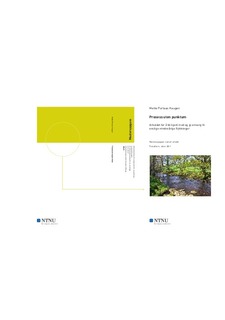| dc.contributor.advisor | Berg, Berit | nb_NO |
| dc.contributor.author | Haugen, Mette Portaas | nb_NO |
| dc.date.accessioned | 2014-12-19T14:33:44Z | |
| dc.date.available | 2014-12-19T14:33:44Z | |
| dc.date.created | 2011-07-11 | nb_NO |
| dc.date.issued | 2011 | nb_NO |
| dc.identifier | 430464 | nb_NO |
| dc.identifier.uri | http://hdl.handle.net/11250/267760 | |
| dc.description.abstract | Bakgrunn: I fjor ankom 892 enslige mindreårige asylsøkere Norge og denne oppgaven handler om arbeidet med det store flertallet av dem, de som er over 15 år gamle. Dette er en mangfoldig gruppe, men de har til felles at de kommer uten de menneskene som i oppveksten deres har hatt hovedansvaret for å ivareta deres behov og fremme deres utvikling. I Norge er det ansatte på asylmottak og i bosettingskommuner som har dette ansvaret. De må være som foreldre i foreldrenes sted, med mindre ungdommene har slektninger her som kan ha omsorgs- og oppfølgingsansvar for dem. De mottaks- og kommuneansatte kjenner ikke ungdommene, og må bli kjent med dem parallelt med at de gir dem god omsorg og oppfølging. Denne oppgaven stiller spørsmål om hvilke utfordringer som ligger i dette arbeidet. Oppgaven stiller også spørsmål om hvordan ansatte på asylmottak og i bosettingskommuner forholder seg til de utfordringene de står overfor.
Fremgangsmåte: Disse spørsmålene er forsøkt belyst gjennom kvalitative, semistrukturerte intervju med tre mottaksansatte på to asylmottak og seks kommuneansatte i fem bosettingskommuner med lang erfaring fra arbeidet med enslige mindreårige asylsøkere og flyktninger. De intervjuede har delt rike beskrivelser av og refleksjoner omkring sitt arbeid. Arbeidet med å bearbeide og analysere dette materialet er inspirert av prinsipper fra grounded theory. De sentrale temaene i datamaterialet settes i sammenheng med og drøftes opp mot tidligere forskning, offentlige dokumenter og annen relevant litteratur på dette feltet.
Funn: Deltakerne beskriver utfordringer i arbeidet med å bli kjent med de enslige mindreårige. Disse utfordringene kan være knyttet til rammebetingelsene for arbeidet med denne gruppen og til ungdommenes opplevelser, ønsker og strategier. Arbeidet kompliseres ved at de unge er i bevegelse, som mennesker, som ungdommer og som flyktninger. Deres behov og ressurser endres, og deltakerne beskriver hvordan disse bevegelsene kan oppleves som uforutsigbare. Deltakerne møter disse utfordringene ved å skape rom for og tid til å bli kjent med ungdommene. Arbeidet på asylmottakene og i bosettingskommunene ser ut til å være så fleksibelt at det rommer ungdommenes bevegelser. Omstendigheter utenfor arbeidet med ungdommene og prosesser inne i ungdommene kan være med på å fremme denne fleksibiliteten. | nb_NO |
| dc.description.abstract | The Setting: 892 unaccompanied asylum seeking children arrived in Norway last year and this project focuses on the work with those who are older than 15 years of age, which is the large majority of the group. This is a diverse group, but they have in common that they arrive without the people who during their childhood had the primary responsibility for their care and development. Unless the children have relatives in Norway, these responsibilities will fall upon employees of reception centres for asylum seekers and of the municipalities where asylum seekers can be resettled. These employees are not familiar with the children, and will have to get to know them while they simultaneously provide them with care and follow-up. This project raises questions about the challenges in this work. The project also raises questions about how the employees of reception centres and the municipalities respond to the challenges they face.
Procedure: It has been attempted to illuminate these question through qualitative, semi-structured interviews with three employees of two reception centres for asylum seekers and with six employees of five municipalities. The persons interviewed shared detailed descriptions of their work and interesting reflections about it. The material gathered from the interviews was analysed through principles inspired by grounded theory. The central themes in the material are related to and discussed against previous research, public documents and other relevant literature in this field.
Findings: The participants describe challenges in the work of gaining knowledge of the unaccompanied asylum seeking children. These challenges are tied to the general conditions of the work with this group and to the experiences, dreams and strategies of the adolescents. The work is further complicated by the fact that the young people are in motion, as humans, as adolescents and as refugees. Their needs and their resources change, and the participants in the project describe how these changes are experienced as unpredictable. The participants face these challenges by making the space and taking the time necessary to get to know the young people. The work done in the reception centres and in the municipalities seems to be flexible enough to allow room for the young persons’ changes. Circumstances outside the work with this group and processes within the young people can promote this flexibility.
| nb_NO |
| dc.language | nor | nb_NO |
| dc.publisher | Norges teknisk-naturvitenskapelige universitet, Fakultet for samfunnsvitenskap og teknologiledelse, Institutt for sosialt arbeid og helsevitenskap | nb_NO |
| dc.subject | Social and Behavioural Science, Law | en_GB |
| dc.title | Prosess uten punktum: Arbeidet for å bli kjent med og gi omsorg til enslige mindreårige flyktninger | nb_NO |
| dc.type | Master thesis | nb_NO |
| dc.source.pagenumber | 111 | nb_NO |
| dc.contributor.department | Norges teknisk-naturvitenskapelige universitet, Fakultet for samfunnsvitenskap og teknologiledelse, Institutt for sosialt arbeid og helsevitenskap | nb_NO |
